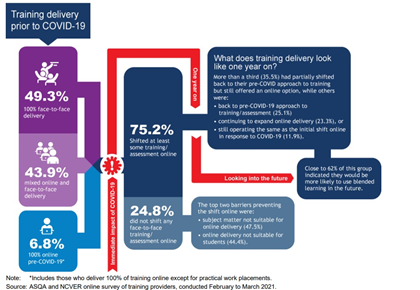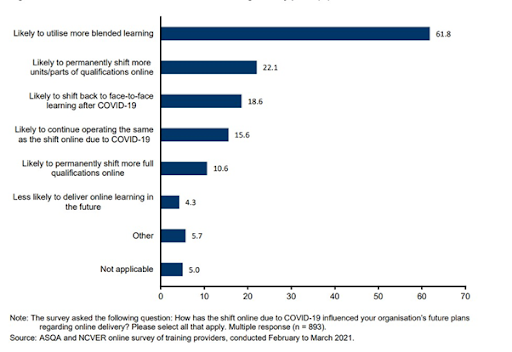IDP Live transforms international landscape for next generation of students
IDP has recently launched its new student-centred app, IDP Live. IDP Live brings together a suite of tools, including a ground-breaking new service that fast-tracks students through to receiving an offer, prior to submitting their application – ensuring that students can find the right courses and institutions faster and more easily.
For more information, please visit here.
Plan to bring thousands of nurses and doctors into ‘Fortress Australia’
Australia will allow 2000 overseas nurses and doctors to enter the country for work under a plan being finalised by the Commonwealth and states to ease a healthcare staffing crisis.
With Melbourne and Sydney’s hospital beds jammed with COVID-19 patients and the health systems of other states also under strain, the reinforcements will be flown in over the next six months and predominantly dispatched to outer suburban and regional hospitals and GP clinics.
For more information, please visit here.
Child Care subsidy changes to benefit 250,000 Australian families
A quarter of a million Australian families will be more than $2200 a year better off when additional childcare subsidies are introduced early next year.
The additional subsidies for families with two or more children in care were due to start in July 2022, but the federal government has brought the start date forward to March.
Education and Youth Minister Alan Tudge said the $1.7bn boost to the subsidy scheme would ease pressure on working families and encourage more parents into work.
“These changes are good for families and great for the economy, and it’s significant that we are able to deliver them sooner,” Mr Tudge said.
For more information, please visit here.
Students head to Canada as Australia’s borders remain shut
Australia’s privileged position as one of the most highly prized destinations for international students has tumbled as Canada, the United States and Britain race to grab greater market share, a new survey has shown.
Australia’s share of demand from international students has declined from 16.8 per cent to 11.6 per cent over the past two years, according to data from IDP Connect. And with migration opportunities and face-to-face learning the most important factors driving decisions about where to study, Australia needs to quickly and clearly communicate to students that it will be open for business in 2022.
For more information, please visit here.
Amendments to the ESOS Act effective 27 September 2021
Recent amendments to the Education Services for Overseas Students Act 2000 (ESOS Act) have replaced existing legislation around monitoring, investigation, and enforcement. This brings the ESOS Act and the National Vocational Education and Training Regulator Act 2011 (NVR Act) into closer alignment.
ASQA’s regulation of training providers will remain the same, with a commitment to best practice regulation to ensure quality outcomes and integrity in VET and ELICOS training.
The regulatory implications for training providers are minor, however some changes include:
- the ways a penalty amount is calculated for an infringement notice
- allowances for person(s) to assist an Authorised Officer, and therefore exercise powers and use reasonable force in relation to things as required
- broadening of the definition of evidential material, aligning it more closely to the definition contained in the NVR Act.
The amendments to the ESOS Act replace the existing monitoring, investigation, and enforcement powers with largely equivalent powers under the Regulatory Powers (Standard Provisions) Act 2014 (RPSP Act). The RPSP Act contains a standard set of regulatory provisions that exist to provide consistent regulatory powers and promote best practice regulation across Commonwealth regulators.
For more information, please visit here.
ASQA Update – October 2021
ASQA’s risk-based regulatory program in 2021-22 has been informed by the outcomes of our annual environmental scan, which brings together feedback from stakeholder groups and regulatory data – and includes a focus on both provider and systemic risks.
As a best-practice regulator, ASQA implements a risk-based approach to regulation, focusing regulatory attention on areas of greatest risk exposure to manage our resources effectively and minimise regulatory burden on providers. In doing so, we make the best use of a range of regulatory approaches using a variety of regulatory treatments – education, registration and approvals, course accreditation, monitoring and performance assessment (audit), compliance management and internal review of decisions – to apply proportionate and fit-for-purpose responses.
For more information, please visit here.
2021 fee relief now available to VRQA RTOs and non-school providers
Fee relief is available to eligible registered training organisations (RTOs) and non-school senior secondary providers (NSSSPs) to help ease the ongoing economic impact caused by the coronavirus (COVID-19) pandemic.
The Minister for Education and the Minister for Training and Skills have provided fee relief to RTOs and NSSSPs by:
extending the VRQA’s financial powers to issue refunds to eligible providers which paid VRQA annual and re-registration fees between 17 February and 29 September 2021
waiving VRQA annual and re-registration fees that were due to be invoiced between 29 September and 31 December 2021 under Ministerial Order No. 1337.
Fees where invoices had been raised, between 17 February and 29 September 2021, but not yet paid will also be waived.
Schools and public sector bodies are not eligible for fee relief.
We are providing fee relief to eligible organisations, regardless of circumstance. We will notify you by email if you are eligible.
For more information, please visit here.
6 interesting stats from the Voice of VET RTO Industry Australia Report 2021
Australia’s Registered Training Organisations had a lot to say in this year’s Voice of VET Report. Here’s three things RTOs say have changed (and three things that haven’t).
ReadyTech’s Voice of VET RTO Industry Report 2021 contains a lot of interesting insights into the RTO market. Based on a survey of 328 RTOs with a combined footprint across all Australian states and territories, it collates these responses to reveal a range of views, opportunities and challenges.
One of the key themes of this year’s report was the resilience shown by RTOs as they planned for 2021. Embracing new market opportunities as well as digital transformation, there was a clear desire to move forward from the trials of Covid-19 in 2020 into a new era of change and growth this year.
For more information, please visit here.
Homeschool registrations rising in Australia, alternative education advocates say mainstream schools need a shake-up
Homeschooling is understood to be the fastest-growing education sector and alternative school advocates say it shows mainstream schooling needs a shake-up.
For more information, please visit here.
New national food allergy guidelines recommend education instead of bans
New allergy guidelines have recommended removing blanket bans on foods from schools and childcare centres in favour of greater education and awareness around allergies and anaphylaxis. Released on Thursday, the National Allergy Strategy — developed with experts — aims to clarify managing and preventing anaphylaxis in schools, with research suggesting up to 1 in 20 school-aged children in Australia have food allergies.
The strategy has been in development for two years and is underpinned by “best practice guidelines for the prevention and management of anaphylaxis in schools and children’s education and care”.
For more information, please visit here.
Quality higher education in times of crisis
Higher education is still suffering the consequences of the COVID-19 crisis. In some parts of the world, the crisis is as acute as ever. In Europe, we hope we are through the worst of it, but we have seen time and again over the past months that coping with the health crisis requires more time and effort than we had originally believed.
At the same time, the COVID pandemic should serve to remind us that we need to prepare for the next crisis. We do not know when it will come or what kind of emergency it will be. We do know, however, that we will need to ensure students’ right to quality education also in times of crisis.
For more information, please visit here.
NSW on the road to reopening
NSW will take its first steps towards reopening as the State passes the 70 per cent double vaccination target.
With the first vaccination milestone being reached, the NSW Government is also easing a number of restrictions as part of the Reopening NSW roadmap, which will allow fully vaccinated adults to enjoy more freedoms from next Monday, October 11.
The changes to the 70 per cent roadmap will allow up to 10 visitors (not counting children 12 and under) to a home (previously five), lift the cap on outdoor gatherings to 30 people (previously 20), and increase the cap for weddings and funerals to 100 people (previously 50).
For more information, please visit here.
Teachers are driving force behind ‘global education recovery’ from COVID-19
World Teachers’ Day, celebrated annually on 5 October, provides an important opportunity to call on Governments and the international community to spotlight teachers and their challenges, and share effective and promising policy responses.
“They are the principal actors of the global education recovery efforts and are key in accelerating progress towards inclusive and equitable quality education for every learner, in every circumstance”, the statement continued.
From using technology creatively to providing socio-emotional support to their students, and reaching those most at risk of falling behind, teachers have been at the heart of the educational response to the COVID-19 crisis.
For more information, please visit here.
Beyond Zoom, Teams and video lectures — what do university students really want from online learning?
As any university student, lecturer or tutor can attest, the pandemic has turned learning and teaching upside down. So it’s important we understand what happens for students when their learning shifts online with little to no warning.
Since 2020, there’s been a growing body of important research into the impact of online learning for educators. But the student voice, which is essential to informing good design and facilitation of online learning, has been largely unexamined.
Our Student Online Learning Experiences (SOLE) research project aims to rectify this and give voice to those who are, arguably, at the heart of the COVID-19 education crisis.
The study uses data from nearly 1000 survey responses from students across all eight New Zealand universities. Through a combination of online questionnaires, individual and focus group interviews, we explored their experiences of online learning during the pandemic in 2020.
For more information, please visit here.
Fiverr Expands Online Education Offering With Acquisition of CreativeLive
Fiverr (NYSE: FVRR), the company that is changing how the world works together, today announced its acquisition of Seattle-based online learning company CreativeLive, a renowned creative and entrepreneurial education platform where people can learn about design, business, photography, video, marketing and more. Instructors include a diverse group of Pulitzer-, Grammy-, and Oscar-winners, New York Times best-selling authors, thought leaders and legendary entrepreneurs.
For more information, please visit here.
India top court rules online education access cannot be denied to underprivileged children
The Supreme Court of India ruled on Friday that if the fundamental right to education under “Article 21A of the Constitution has to become a reality,” then the needs of underprivileged children “to receive adequate access to online education cannot be denied.”
For more information, please visit here.
Online Learning Platforms A Lifeline For Students During The Pandemic
There have been many forced changes in the world over the past 18 months, with every industry seeing some form of impact. Life is slowly but surely becoming recognizable again, but in the education sector there is a new normal, one that makes getting extra help and benefitting from shared resources more convenient than ever before.
Anyone who has been involved in education, from parents to students has seen and experienced the almost overnight switch to a remote style of learning. Schools across the world have been forced to utilize technology, and it may be a while still before traditional classrooms, lecture halls and indeed teaching methods are back in use
Trying circumstances can be difficult, but evolution and innovation can and has thrived in these environments, and instead of simply being the ‘only alternative’ to brick and mortar teaching and tutoring, more students than ever before are discovering the fantastic benefits of online education and online tutoring through platforms such as Studypool.
For more information, please visit here.
Challenges Of Online Education For Teachers And Students
Covid-19 and the consequent lockdown forced schools, colleges and universities to stop all regular face-to-face educational interactions between teachers and students. They had to move literally overnight to the online-only learning-teaching model. This entailed not only the proficiency of both teachers and the students in quite unfamiliar sets of competencies but also focused mitigation of infrastructural limitations like poor connectivity and low-end devices, revealing several inherent inadequacies of the existing education system.
Developments beneficial to the realm of information and communication technology (ICT) – like increased internet penetration, focus on appropriate skilling of the nation’s workforce and strengthening of the country’s digital infrastructure for education – had already sparked off some growth in the Indian educational technology (edtech) sector. The COVID-induced home confinement significantly increased the demand for online education as educational institutions as well as affluent individual families were compelled to provide for the use of information and multimedia education technologies to facilitate quality learning experiences for students.
In India, edtech start-ups emerged in 2020 as the segment with the highest quantum of finances having received – in just the first nine months of the year – venture capital (VC) investments worth US$ 1.5 billion, as compared to US$ 409 million in the whole of 2019. As per authentic research, the ongoing pandemic has triggered off a 3-5 per cent rise in free audiences and 50-100 per cent growth in monthly revenues of several edtech companies. Such growth exhibits that for the global and domestic venture capital and private equity firms, the most preferred segment without a doubt is edtech.
According to reliable reports, Indian K-12 online education is projected to become a US$ 1.7 billion market by 2022 with a growth of 6.3 times. Initially, the sphere of edtech was focused predominantly on the K-12 segment. Now, however, the post-K12 market too – which consists mainly of digital support for college and university courses, prepping for competitive examinations and corporate training in addition to a few other components – is expected to grow 3.7 times to be worth US$ 1.8 billion. The entire Indian edtech market appears all set to reach US$ 3.5 billion by 2022.
For more information, please visit here.
School And Online Learning Evolve Rapidly: Nerdy CEO Discusses Trends
As some students get back to school amid a new wave of variants and ongoing anxiety, the future of school and how students will learn continues to evolve rapidly.
According to research I’ve been involved in during Covid as well as multiple reports I have reviewed from Barkley, Gen HQ & Pew Research, Gen-Z is likely more impacted by Covid than any other cohort. Older generations are certainly affected by Covid but many have completed education, started careers and often started families.
In the case of Gen-Z they had their prom cancelled, their classroom opportunities modified, their social lives disrupted and even their parents are now using Tik Tok. That’s a true disruption.
For more information, please visit here.
A New Normal For Online Education
The headline appeared in the New York Times on February 21, 1994: “Computers and Phones Pave New Path to College Degree.” The article characterized how the future of the college classroom “may be no classroom at all.” It went on to describe rising demand among students for “long-distance study” (the term online education hadn’t yet entered our vernacular). Among many faculty members quoted in the article, however, there was skepticism about teaching over a computer.
Fast forward to today, more than 25 years later. Online education has been the main driver of growth in higher education enrollments in the United States over the last decade, even before the Covid-19 pandemic forced essentially every college course to be delivered remotely.
According to the U.S. Department of Education, one out of every three college students took at least one online class in 2018, representing 6.95 million learners. The share of online students in the U.S. has increased by 30 percent since 2010, even as the number of on-campus students dropped by more than a million.
For more information, please visit here.
Online Learning – The Future of Education?
The coronavirus pandemic that gripped humanity in early 2020 has led to unprecedented educational measures everywhere.
Educational institutions, from schools to universities, have been partially or completely closed in more than 180 countries. In most states, all schools were completely quarantined, while some were closed in the United States, Canada, Europe, Russia, Vietnam, and Australia. According to UNESCO, these measures affected 91% of the world’s students.
Even though the forced introduction of online education has already revealed not only the advantages but also the disadvantages of the modern academic system, experts and educators themselves are increasingly saying that the future of global education lies in online learning.
For more information, please visit here.
Online Learning Platforms A Lifeline For Students During The Pandemic
There have been many forced changes in the world over the past 18 months, with every industry seeing some form of impact. Life is slowly but surely becoming recognizable again, but in the education sector there is a new normal, one that makes getting extra help and benefitting from shared resources more convenient than ever before.
Anyone who has been involved in education, from parents to students has seen and experienced the almost overnight switch to a remote style of learning. Schools across the world have been forced to utilize technology, and it may be a while still before traditional classrooms, lecture halls and indeed teaching methods are back in use
Trying circumstances can be difficult, but evolution and innovation can and has thrived in these environments, and instead of simply being the ‘only alternative’ to brick and mortar teaching and tutoring, more students than ever before are discovering the fantastic benefits of online education and online tutoring through platforms such as Studypool.
For more information, please visit here.
How online education can give disabled children greater learning opportunities
Globally, about 15 per cent of the population lives with some form of disability. Of this, 80 per cent lives in developing countries. Persons with disabilities (PwDs) are among the most marginalised groups. They encounter a range of barriers and are more likely to experience adverse socioeconomic outcomes. Limited support infrastructure can have a significant debilitating impact on everyday life. WHO now considers disability a human rights issue. It emphasises that people are disabled by society and not by their bodies.
Over the last 65 years, the overall global literacy rate has increased by 4 per cent every five years — from 42 per cent in 1960 to 86 per cent in 2019. However, the global literacy rate for the disabled is as low as 3 per cent with just 1 per cent for females. Ninety per cent of disabled children in developing countries do not attend school, says UNESCO. The school drop-out rate is also high due to the lack of adequate infrastructure, inaccessible reading material and untrained teachers. An insignificant number make it to institutes of higher learning.
Lack of education has a trickle-down effect. Most disabled children are not equipped with foundational skills for employability. According to the UN, in developing countries, 80 to 90 per cent of PwDs are unemployed, whereas in industrialised countries, it is between 50 to 70 per cent. In most countries, the unemployment rate for PwDs is at least twice that of those who have no disability.
For more information, please visit here.
Student sex work is happening, and universities need to respond with health services
As university and college semesters unfold, a small but increasing percentage of students will likely also be taking on a largely under-reported and overlooked form of part-time employment: sex work.
Over the past year, there have been multiple reports of a dramatic increase in content creators on OnlyFans — a platform that allows fans to pay creators directly for content, which has been popular with sex workers. Some new users say they created accounts to navigate financial hardship during COVID-19. OnlyFans platform reported a huge uptick in users during the pandemic: from 7.5 million users in November 2019 to 85 million in December 2020.
For more information, please visit here.
How much will it cost for international students to return to Australia?
New South Wales and Victoria recently announced pilot plans to facilitate international students’ return to Australia. This is welcome news for those who have been locked out of the country for the better part of 18 months but the return to Australia cost could be a problem
According to The Guardian, some students worry that degrees such as medicine and engineering will be prioritised over others. Australia’s strict border measures caused its universities to suffer a 6% — or 2.2 billion Australian dollar — drop in revenue in 2020, said a report from the Mitchell Institute.
For more information, please visit here.
Experts weigh in on Australia’s 10-year strategy at AIEC
The Australian government is hoping to release its anticipated Australian Strategy for International Education 2021-2030 before the year is out, a government representative said at the Australian International Education Conference 2021.
The strategy – which government launched a consultation on earlier this year – has received over 120 written submissions, assistant secretary at the department of Education, Skills and Employment, Simon Moore revealed.
With an additional 1,600+ individuals participating in consultation process webinars and workshops, the government has a “strong foundation” to develop the strategy, he continued.
For more information, please visit here.
Hate crime victim inspires We Are Australia launch
We Are Australia, a dedicated organisation to support international student victims of crime in Australia, was launched on October 1, pledging to be the voice of international student victims.
For more information, please visit here.
Keystone acquires UniQuest in enrolment generation drive
This is another acquisition for Keystone as it evolves its business mission.
Historically, the Norway-based business has been focused on lead generation and the move to acquire UniQuest will provide more value to customers – especially around enrolment generation, the company noted.
Keystone expects the move will help it further evolve into a “complete end-to-end lead-to-enrolment generation platform”.
The acquisition is the latest in a handful of buyouts and mergers in the past year for the company, including EMG and acquisitions of FindAUniversity, College Scholarships USA, and AGM Education.
For more information, please visit here.
Australian far-right terrorism investigations have increased by 750 per cent in 18 months
Two years ago, nationalist and racist violent extremism barely accounted for two per cent of the Australian Federal Police’s counter-terrorism caseload. Now it’s the country’s fastest-growing threat.
For more information, please visit here.










